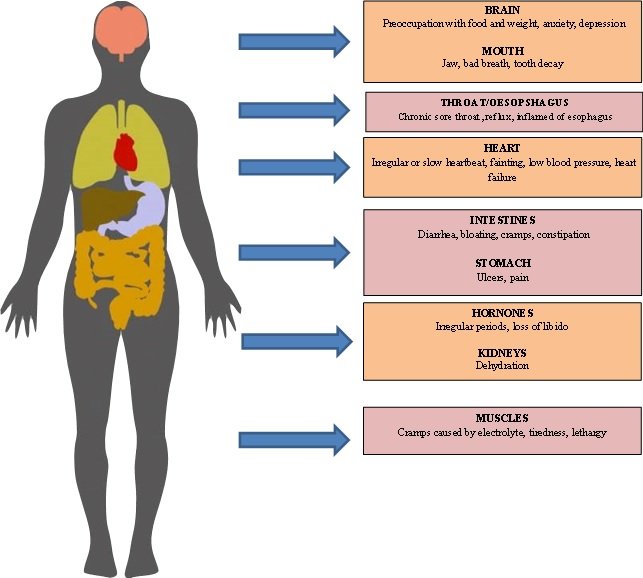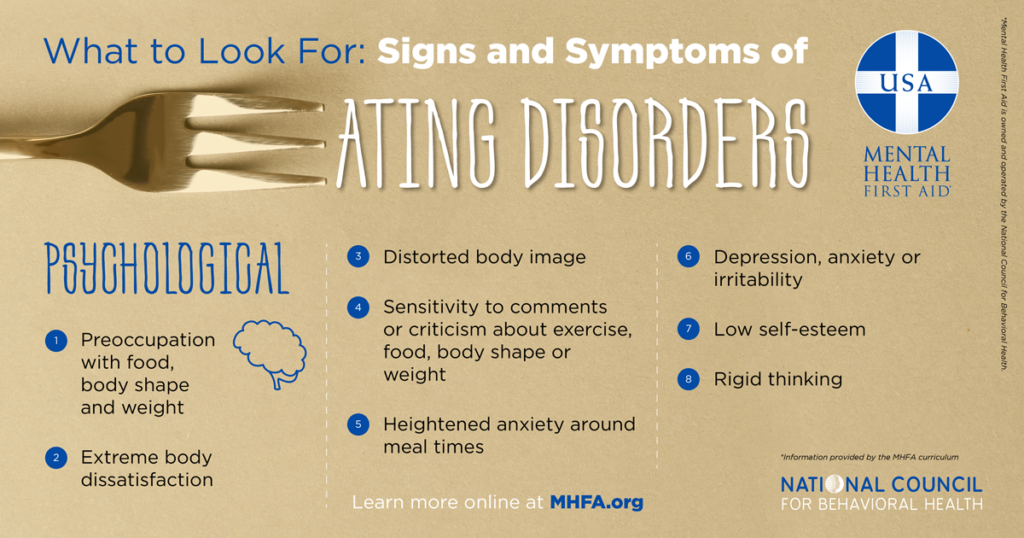
Bulimia nervosa is a severe eating disorder characterized by recurrent episodes of binge eating followed by compensatory behaviors, often referred to as purging. An individual with bulimia will consume large quantities of food in a short period, and then take drastic steps to prevent weight gain, like self-induced vomiting, use of laxatives, diuretics, or excessive exercise.
While many discussions focus on the immediate or short-term effects of bulimia nervosa, it is equally essential to shed light on the long-term consequences of bulimia. As a society, we must be aware of the profound impact this disorder can have on an individual’s physical health, mental health, and overall well-being.
Physical Consequences

The physical consequences of bulimia can be far-reaching, impacting various body systems.
Gastrointestinal system: Regular self-induced vomiting can lead to serious complications, such as gastroesophageal reflux disease (GERD), gastric ulcers, and in severe cases, a rupture in the esophagus.
Dental health: The acid from repeated vomiting can wear away tooth enamel, leading to cavities, tooth sensitivity, and discoloration.
Electrolyte imbalances: Purging behaviors can cause severe electrolyte imbalances. These imbalances, particularly low potassium levels, can result in life-threatening conditions, such as irregular heart rhythms and kidney failure.
Bone health: The malnutrition associated with bulimia can cause osteoporosis, leading to fragile bones and an increased risk of fractures.
Psychological Consequences

Bulimia does not only impact the body but also the mind. The psychological consequences are often profound and long-lasting.
Depression and anxiety: Individuals with bulimia are at a high risk for mood disorders like depression and anxiety. The secretive nature of the disorder, the stigma attached to it, and the guilt and shame surrounding their behaviors often contribute to these mental health issues.
Substance abuse: Some people with bulimia may turn to alcohol or drugs as a way to cope with their emotions, leading to substance abuse problems.
Self-esteem issues: The struggle with body image and weight can result in long-term issues with self-esteem and body dissatisfaction.
Social isolation: Many individuals with bulimia isolate themselves from friends and family to hide their eating disorder, leading to feelings of loneliness and detachment.
The long-term effects of bulimia nervosa can significantly impact a person’s quality of life. While the short-term effects of bulimia nervosa like weight fluctuations, fatigue, and poor concentration are well-known, it is the long-term consequences that often carry the gravest health risks.
When thinking about the long-term consequences of bullying, we often imagine mental health issues and interpersonal struggles. Similarly, the long-term effects of an eating disorder like bulimia are multifaceted and extend far beyond the immediate physical symptoms.
While the connection between bulimia and binge eating disorder is often made, it’s important to understand the distinct long-term effects of each. Like bulimia, binge eating disorder can also result in obesity, high blood pressure, and heart disease. However, the long-term effects of binge eating disorder often center around obesity-related complications, like type 2 diabetes and heart disease, while bulimia’s long-term effects are largely related to malnutrition and self-induced vomiting.
What Long-Term Effects Does Bulimia Cause?

In essence, bulimia can affect nearly every part of the body, leading to a variety of complications. From increased risk for heart disease and certain types of cancer to psychological consequences such as severe depression and anxiety disorders, bulimia’s effects are far-reaching and often long-lasting.
Understanding the long-term effects of bulimia nervosa is critical to recognizing the seriousness of the disorder. It’s more than just a phase or a diet gone wrong—it’s a serious mental health condition that requires professional treatment.
Bulimia is often shrouded in secrecy, but increasing awareness about its consequences can help to destigmatize the disorder and encourage individuals to seek help. If you or someone you know is struggling with an eating disorder, it’s important to reach out to healthcare professionals who can provide the necessary support and treatment.
Overcoming Bulimia

While the long-term consequences of bulimia can be severe and wide-ranging, it’s important to remember that help is available and recovery is achievable. The first step towards recovery is recognizing the problem and seeking help. This can be a daunting task given the stigma associated with mental health issues and eating disorders. But remember, there is no shame in asking for help.
Getting Help
If you or a loved one is struggling with bulimia, there are several resources available:
Professional Help: Therapists and psychologists experienced in treating eating disorders can offer various therapy options such as cognitive-behavioral therapy (CBT), dialectical behavior therapy (DBT), or family-based treatment (FBT).
Medical Assistance: Doctors can help manage immediate physical complications and ensure the individual’s safety during the recovery process.
Nutrition Counseling: Dietitians can provide guidance on healthy eating habits and work towards restoring a healthy relationship with food.
Living a Healthy Life Post-Bulimia

After initial recovery, maintaining a healthy lifestyle becomes a critical part of preventing relapse. Here are a few strategies:
Healthy Eating Habits: Encourage regular meals and a balanced diet. This can help reduce the urge to binge and purge.
Exercise: Regular exercise can improve mental health by reducing anxiety and improving mood. It should be done in moderation and with a focus on health rather than weight control.
Mindfulness: Practices like yoga and meditation can help manage stress and promote a positive body image.
Support Networks: Having a support system of friends, family, or support groups can provide reassurance and encouragement.
Long-Term Consequences Are Not a Life Sentence
While this article aims to highlight the long-term effects of bulimia nervosa, it’s crucial to note that these effects are not inevitable. Early intervention can help prevent many of these consequences, and even those who have been struggling for a long time can still improve their physical and mental health through treatment.
The journey towards recovery from bulimia, like any eating disorder, can be challenging. However, the potential long-term consequences of not seeking help are far more severe. It’s never too late to reach out for support and start the journey to recovery.
Through awareness and education, we can shed light on the long-term consequences of bulimia and other eating disorders, helping to create a world where everyone feels comfortable seeking the help they need.
Conclusion
In conclusion, bulimia nervosa has severe long-term consequences that affect both physical and mental health. By acknowledging and understanding these effects, we can spread awareness, reduce stigma, and encourage those struggling to seek help. Recovery from bulimia is absolutely possible, and the sooner one gets help, the less likely these long-term consequences of bulimia will persist.
While it may take time and patience, recovery can lead to a healthier, happier life free from the control of this destructive eating disorder. Don’t let the silence surrounding bulimia continue — the long-term consequences are too serious to ignore.
National Eating Disorders Association is a great resource for anyone seeking help or wanting to learn more about eating disorders.
Remember, it’s never too late to seek help and begin the journey toward recovery.











